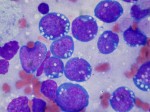 A new study published in Nature Communications suggests that disrupted metabolism could be the reason behind a deathly blood cancer called diffuse large B-cell lymphoma (DLBCL).
A new study published in Nature Communications suggests that disrupted metabolism could be the reason behind a deathly blood cancer called diffuse large B-cell lymphoma (DLBCL).
Study authors, including researchers from the School of Medicine at the University of Texas Health Science Center at San Antonio, discovered that D2HGDH—the gene that codes for an enzyme and is important for cell metabolism—is mutated in diffuse large B-cell lymphomas.
Lymphomas that contain mutant forms of D2HGDH apparently have low levels of the metabolite alpha-ketoglutarate (alpha-KG). In order for the cells to remain healthy, they need a steady level of alpha-KG.
Researchers discovered that when there were low levels of alpha-KG, another enzyme called dioxygenases does not function to its maximum ability—which results in an additional disturbance.
Researchers conclude that since alpha-KG plays an essential role in aging and keeping stem cells healthy, study findings won’t only be limited to cancer biology.
There are two central types of lymphoma—Hodgkin lymphoma and non-Hodgkin lymphoma. The most common type of non-Hodgkin lymphoma is DLBCL, as it accounts for up to 30% of new cases in the U.S.
Image copyright 2006, Ed Uthman
Source for Today’s Article:
Paddock, C., “Aggressive lymphoma linked to disruption in cell energy production,” Medical News Today web site, July 20, 2015; http://www.medicalnewstoday.com/articles/296995.php.
